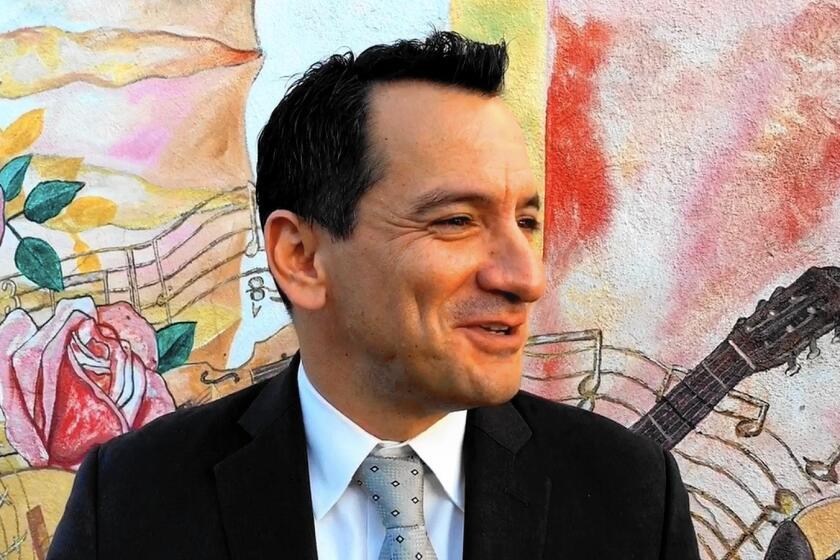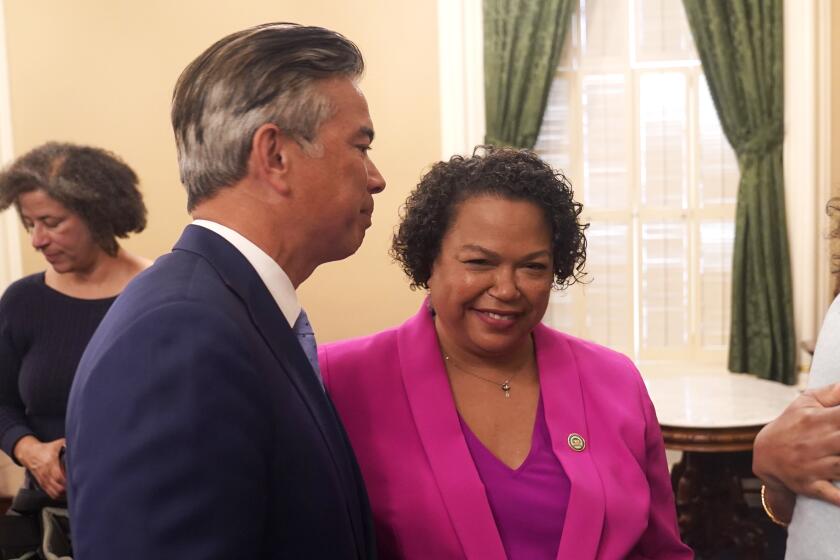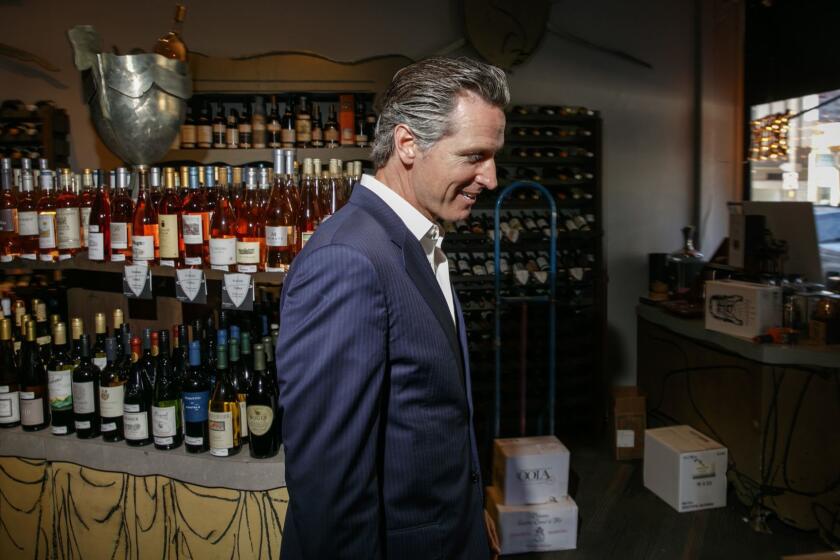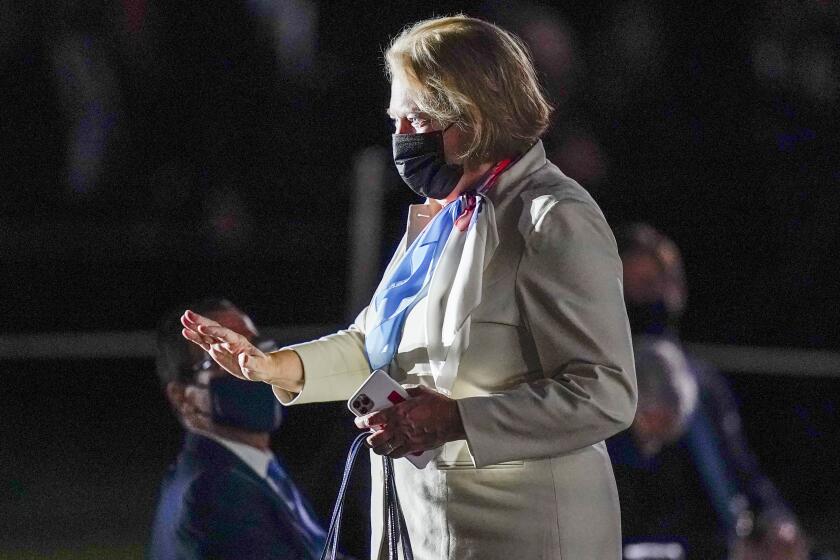As Assembly Speaker Anthony Rendon’s power grew, so did his wife’s income
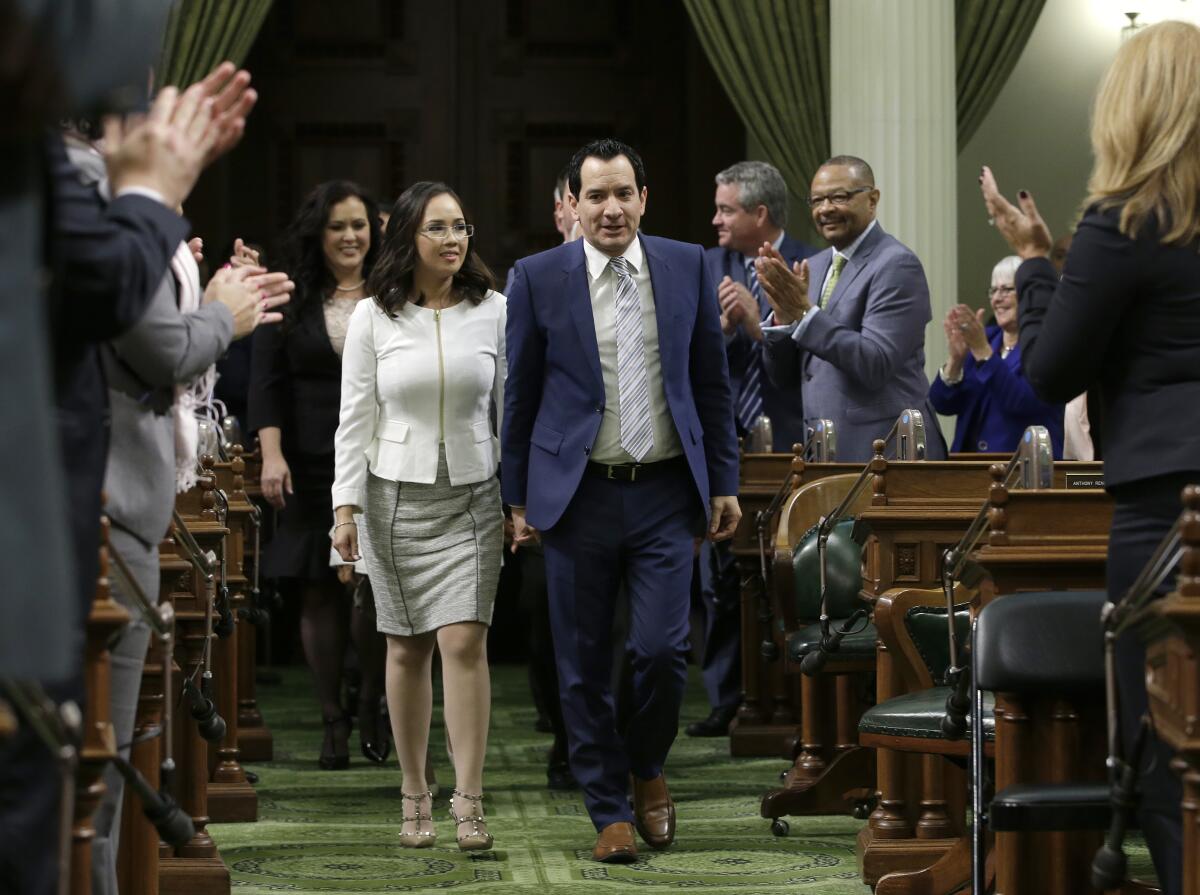
- Share via
SACRAMENTO — When California Assembly Speaker Anthony Rendon (D-Lakewood) steps down from his powerful post at the end of the month, he’ll leave behind a legacy as one of the state’s longest-serving legislative leaders, having helped Democrats secure stronger labor protections for gig workers, launch universal preschool and extend a marquee program to combat climate change during his seven-year tenure.
The philosophy section of the Last Bookstore in downtown Los Angeles is wedged in the back of the shop, but Anthony Rendon, a state assemblyman from Lakewood, had no trouble finding it.
Off the Assembly floor, Rendon is also one-half of a political power couple that includes Annie Lam, a successful consultant and nonprofit executive who’s dedicated her career to diversifying California politics and other institutions of power.
The two have flourished together during Rendon’s unusually long time as speaker. He’s held the position longer than anyone but Willie Brown, who led the Assembly in the 1980s and 1990s.
As Rendon’s influence grew, financial and lobbying disclosures show that Lam’s consultancy business similarly boomed. Over the years Rendon served as speaker, Lam has founded a nonprofit, taken on several new clients and became the executive director of six total organizations, work that allowed her income to swell and public profile to soar.
A new, hopeful era is beginning in California’s Capitol as a debilitating period ends.
Though Lam is not a lobbyist, she is paid by an organization that lobbies the Legislature. The League of California Cities has reported paying Lam’s business nearly $600,000 over the last year and a half as it lobbied lawmakers on bills related to housing, homelessness and public safety.
The arrangement is legal, and Lam said her success has nothing to do with her husband’s job. Rendon said his wife’s employment has not affected his decisions as speaker or how he votes on legislation. A spokesperson for the League of California Cities said Lam helps support the group’s diversity goals and does not lobby on bills.
The lofty payments to Lam and her proximity to one of the most powerful politicians in California have raised questions about the potential for spouses to profit from their partners’ public service and create conflicts of interest in the state Capitol.
“It’s not a terrible thing for her to be employed in that way, presuming that she has that expertise to give that advice,” said Ann Ravel, a former member of the Federal Election Commission and former chair of the state watchdog agency, the California Fair Political Practices Commission.
“But what it comes right down to is a question of ethics, and a question of whether or not it’s impairing the ability of the elected official to be impartial and to make decisions that are in the best interest of the state when there is this financial impact on him.”
This is not the first time interests that lobby California politicians have forged financial ties with political spouses, prompting concerns about undue influence. Senate leader Toni Atkins, Gov. Gavin Newsom and Atty. Gen. Rob Bonta, all Democrats, have faced similar scrutiny, while several lawmakers are married to people who work for organizations that lobby the Legislature or have a financial stake in legislation.
In Rendon’s case, while his voting record shows he was not always aligned with the League of California Cities’ positions, Lam earned significant sums from several of the group’s caucuses. More broadly, Rendon’s financial disclosures show that Lam’s income grew as he gained power.
A career on the rise
In 2016, the first year he served as speaker, Rendon’s statement of economic interests showed that his 50% share of Lam’s income ranged from $10,001 to $100,000. By 2018, Rendon’s share had exceeded $100,000, meaning Lam’s business was raking in more than $200,000. It’s unclear exactly how much Lam was making, because disclosure forms only require lawmakers to report an income range.
California Assemblywoman Mia Bonta took heat last week for her position as head of a committee overseeing the Department of Justice budget, an agency led by her husband.
For more than a decade, Lam has contracted with the League of California Cities, or Cal Cities, to provide consulting services as executive director to three of the organization’s diversity caucuses. She went to work for the Asian Pacific Islander Caucus in 2013, then took on the Women’s Caucus in 2017 and the LGBTQ Caucus four years after that, according to Rendon’s filings. The caucuses operate as branches of Cal Cities that advocate for issues important to city council members and other elected officials who identify with those populations.
Cal Cities is a regular fixture in the Capitol because it lobbies for the interests of hundreds of local governments that want to shape policy concerning housing, homelessness, public safety and labor regulations. While it has scored some significant wins — successfully blocking a bill to create social housing last year and fighting for $1 billion to be allocated in the state budget to alleviate homelessness — Cal Cities doesn’t always prevail. In recent years, as the state grapples with a worsening housing affordability crisis, lawmakers have pushed back on cities’ demands to maintain local control.
Lam shows up on Cal Cities’ lobbying disclosures, in a section where the organization must detail any expenses that benefit “in whole or in part” elected officials or their immediate family members.
Over the last year and a half, Cal Cities paid Lam’s business $599,932.26, the lobbying reports show. The payments range from $3,000 in a single quarter to more than $188,000, but frequently top $75,000 over a three-month span and compete with how much Cal Cities pays its lobbyists. During the first three months of this year, Cal Cities paid Lam’s business more than $93,000 while it paid roughly $110,924 combined to multiple lobbyists.
Cal Cities did not report how much it paid Lam’s business prior to the final quarter of 2021, when it formally recognized the diversity caucuses as “sub-units” of the organization in its bylaws.
“I have been successful in my two-decade career because I am great at my job,” Lam wrote in an email to The Times. “I have worked hard over the past 20 years to develop my expertise. My accomplishments are my own, and my career is my own, which I started prior to marrying my husband. I love my husband, and I’m proud of him. But this is my career. I stand on my own abilities, accomplishments, and successes.”
Lam’s career in Sacramento began in the early 2000s, when she worked in the offices of Assemblymembers Judy Chu, now in Congress, and Mike Eng, Chu’s husband. In launching her consulting business, Lam has worked to promote Asian and Pacific Islander representation in politics and elevate women and other marginalized groups into power.
“Ms. Lam’s compensation reflected the undeniable value she delivered for the Diversity Caucuses,” Lam’s attorney, Charles H. Jung wrote in a statement to The Times after the story initially published. “She was responsible for a 4-fold expansion of membership within the API Caucus, a more than doubling of programming for the LGBTQ Caucus, and a greater than 6-fold increase in membership for the Women’s Caucus.”
Rendon’s record as speaker
When it comes to policy and budget decisions he makes as speaker, Rendon’s record supporting Cal Cities is mixed. In some instances, he has split with Cal Cities’ legislative positions and voted for bills they oppose.
He helped shepherd a deal last year on two housing bills that Cal Cities opposed, effectively clearing the path to Newsom’s signature. The year before, Rendon voted for another controversial housing measure that Cal Cities also opposed, which narrowly passed his chamber. He also voted for bills to eliminate minimum parking requirements in certain neighborhoods close to public transit, which Cal Cities said it “actively fought against,” and another measure that makes it easier for homeowners to build accessory dwelling units, also known as granny flats or casitas.
In other instances, Rendon has advanced Cal Cities’ goals. As speaker, he has enormous power to shape the state budget. Cal Cities trumpeted its success in a 2022 year-end report, which celebrated securing billions of dollars in the 2022-2023 budget to help local governments mitigate homelessness, comply with recycling regulations, increase the behavioral and mental health workforce, revitalize public libraries, fund environmental and green energy initiatives and increase the affordable housing supply, among other priorities.
Rendon led the Assembly to approve a sweeping and controversial new program that Cal Cities supported over objections from civil libertarians and advocates for people with disabilities. The program, called CARE Court, will compel Californians struggling with mental illness and addiction into treatment. Rendon also routinely aligns with Cal Cities by supporting many less controversial bills the organization lobbies for. Last year, that included new laws that gave local governments more time to comply with composting requirements, cracked down on catalytic converter theft and added resources for first-responder suicide prevention.
The California Assembly passed a measure to allow duplexes on single family lots, but the legislative session ended before the Senate could vote.
“I vote for bills based on the policy itself,” Rendon said.
“Annie doesn’t lobby,” Rendon said, adding that his wife’s success “has to do with her hard work and her talents and the fact that she has been working in politics since before we met.”
“She’s hard-working, she’s intelligent, she’s experienced. She’s worked in this realm before I worked in this realm,” he said.
Ravel said Rendon’s voting record indicates some independence, even though he’s economically benefiting from Lam’s work with the caucuses.
“I think it does matter that he has done that, and that’s a plus,” Ravel said of his votes against Cal Cities’ positions.
Jessica Levinson, a Loyola Law School professor and political ethics expert, urged caution against assuming that Lam’s work is inappropriate just because she’s the speaker’s wife.
“I think we should be really careful about saying spouses are engaged in unethical behavior simply because they are working in a related space and doing well financially,” Levinson said. “My question would really be, what is market for what she’s doing and is she somebody you would hire regardless of who she is married to? If the answer is she is being paid an enormous amount of money and that’s fair market and she’s qualified to do that, then I don’t have big ethical concerns.”
A California law passed in 2021 was supposed to make it easier for homeowners to build duplexes, but few are taking advantage of it.
Cal Cities spokesperson Rachel Vincent said Lam’s payments were negotiated separately with each caucus within the organization. Vincent did not answer a question about how much Cal Cities pays other consultants who work with the organization’s caucuses.
“The support services provided by Ms. Lam’s consulting company to the diversity caucuses are not provided for the purpose of helping Cal Cities achieve its policy goals,” Vincent said in an email.
Lam said her work for the three caucuses focuses on “program management, internal organization and governance, membership, and other caucus matters,” and that she has one or two staff members’ help to handle the workload.
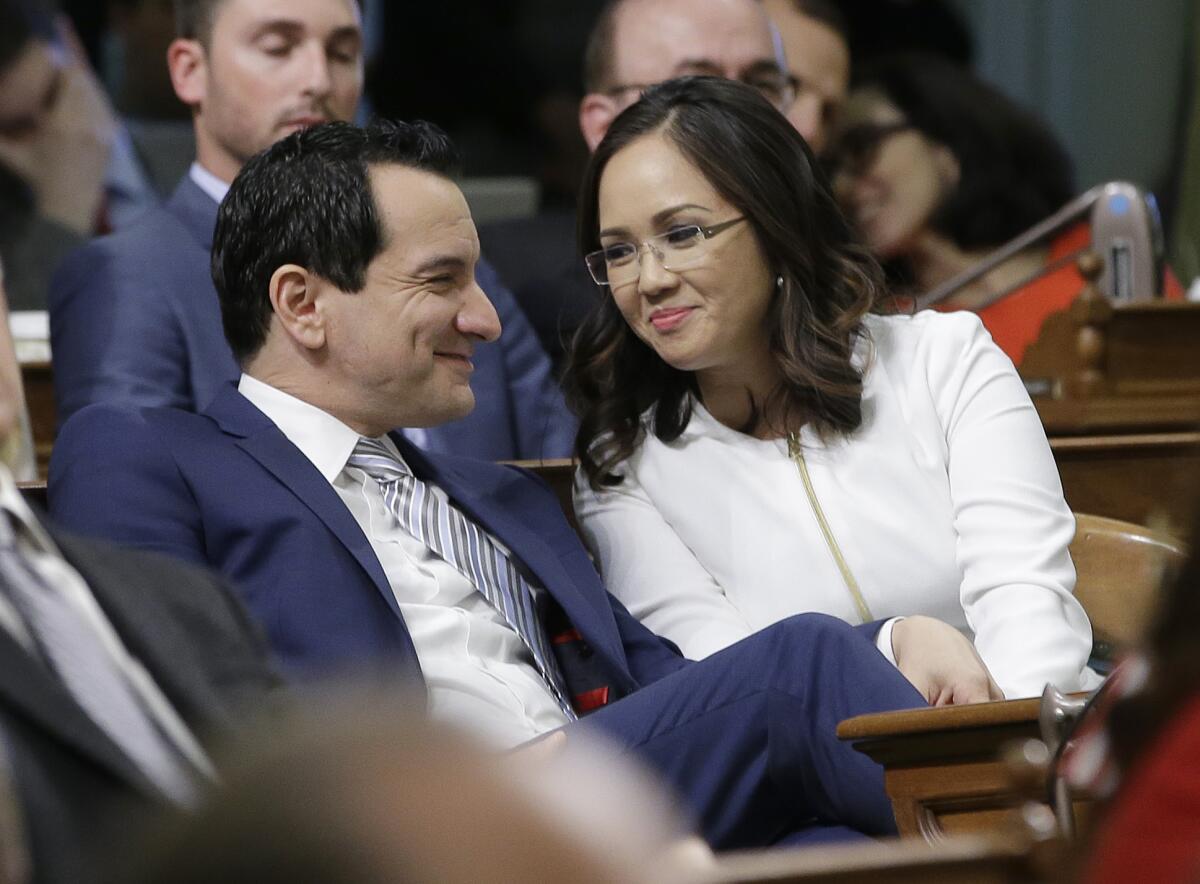
“I do not report to Cal Cities — and to be clear I don’t always agree with Cal Cities,” she said. “I report to the three diversity caucuses.”
A push for transparency
Even as Rendon and Cal Cities have seemingly complied with reporting requirements, experts say more can be done to ensure greater transparency from elected officials. That includes modifying the annual statements of economic interest to require additional details on how much their spouses or they themselves are making on work outside the Capitol, rather than asking them to check a box with a range. That could provide the public greater insight into their personal wealth and financial interests.
“It is really important to have some specificity,” Ravel said. “Because just checking off $100,000 or more, it could be millions. So people are really not getting the information that they need to assess whether that amount of money — and the amount of money is significant — has created some kind of a conflict.”
Newsom’s holdings have the potential to create ethical conflicts between his job as California’s chief executive and his business interests.
Those transparency changes could have a ripple effect beyond Rendon and Lam.
Reports from both The Times and the Sacramento Bee found that companies lobbying Newsom’s office also helped fund his wife’s nonprofit and salary. Another analysis by The Times found that as Senate President Pro Tem Toni Atkins’ clout grew in the Capitol, her wife’s consulting business similarly soared.
Then-Assemblymember Rob Bonta, now California’s attorney general, founded a foundation while he was in the Legislature that gave $25,000 to a nonprofit where his wife was earning a six-figure salary as CEO, according to a 2020 CalMatters investigation. And a 2021 Sacramento Bee report found that corporations with business before the Legislature were donating to nonprofits connected to Lam.
“Money finds a way in politics,” said Sean McMorris, a program manager at the good-government group California Common Cause.
Conservative activist Virginia ‘Ginni’ Thomas, the wife of Supreme Court Justice Clarence Thomas, is interviewed by the House Jan. 6 committee.
“Both the politician that is in power and the spouse that is potentially operating in the same field or sphere, they’re going to be much more scrutinized about why they are doing what they do and why they are making the amount of money that they do. And there’s also going to be questions about is that money going to influence potentially, either explicitly or implicitly.”
Rendon’s tenure as speaker is slated to come to an end later this month.
But questions about the financial ties between family members of powerful politicians and interest groups that hold sway at the Capitol are not likely to vanish.
At the end of June, Rendon is expected to hand the gavel to Assemblymember Robert Rivas (D-Hollister). Rivas’ brother, Rick Rivas, has served as a political advisor to Govern for California and a vice president of the American Beverage Assn., two groups that lobby the Legislature.
More to Read
Sign up for Essential California
The most important California stories and recommendations in your inbox every morning.
You may occasionally receive promotional content from the Los Angeles Times.

